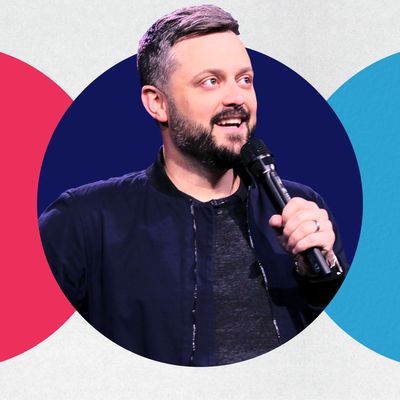
Great jokes — like great jokes — are often about something, like street harassment or parenthood, but a lot of time they are just about the comedian. They are stories that capture everything that is funny and captivating and peculiar about this person onstage. For Nate Bargatze, it’s his joke about seeing a dead horse.
See, it’s hard to pin down what makes Bargatze funny, but whatever it is, it’s all in that six-minute story. At a glance, Bargatze’s an unassuming, 40-year-old white guy with an easy southern drawl. His even, measured cadence and clean material are enough to convince a casual listener that he’ll carry on indefinitely in his gentle way, and there are absolutely no surprises forthcoming. Then, without any obvious tell, Bargatze sidles up to a punch line. Listen to Bargatze once, and its evident how well he exploits an audience’s presumptions about his un-remarkability, and how easily he can put them right where he wants them. He is the son of a magician, after all.
This great joke, which was in Bargatze’s Netflix special, The Tennessee Kid, is the subject of this week’s Good One, Vulture’s podcast about jokes and the people who tell them. Read a short excerpt from the conversation or listen below. Download the episode from Apple Podcasts, Spotify, Stitcher, Overcast, or wherever you get your podcasts.
Good One
Subscribe on:
There are phrases in the dead-horse joke, like “spill the beans,” that are both childlike and formal. Can you talk about your approach to writing when you know you don’t curse and how it makes you a more specific writer?
You just end up saying words differently. Sometimes, I don’t know what words you’re supposed to say. So whatever comes out first is just the one I’ll end up going with, and then if it works and I just keep saying it that way. I say “real good” a lot. No one says real good. By not cursing, I’m having to do a word that maybe is longer than a quick curse word. It changes the whole rhythm of that sentence and then it affects the entire way you tell the joke. If everybody’s dirty, if it’s a topic everybody’s done, I want to do it a different way.
Your comedy seems to acknowledge the existence of magic while grounding it in everyday experience. How much of this do you think is due to your dad’s professional life?
I say it in this special where I was like, “I just thought everybody’s dad was a clown.” Now me doing this, in comedy — when my daughter sees my Netflix special or on The Tonight Show, it’s not a crazy thing. This is all she’s known. So, yeah, my dad being a magician, but also starting as a clown, it was very normal. I come from a very normal family in the sense of everyday life, but we do these things that are very not normal. It’s a mix of those two worlds. I never talked about it at the beginning. I was just like, Why would I talk about that? He’s a magician. That’s just what he does.
Though you started in Chicago and New York, you live in Nashville now. What does it mean to you to be a southern comedian?
The Nashville scene has definitely gotten bigger. I don’t think it’s necessarily because of me — Nashville is doing very good as a city on its own — but it means a lot. It’s nice to show new southern comics that they can do it, and that we’re not just bumbling rednecks. Jeff Foxworthy doesn’t get enough credit. The nicest guy in the world and an unbelievable storyteller. I just watched him a month or two ago. When people think like it’s some trick or like, “He’s just the redneck story guy dumbing it down,” you’re always like, “If it’s just this simple trick, then you go do it and be a success.” There’s way more to it than that.
I want to be a southern comic, I want to be a guy from Nashville, but I would always be sensitive to that stuff at the beginning. You want to stand out and then get above where you’re from, in a way. You don’t want someone to come to this show and be like, “Oh, this is blue-collar kid.” You want it to be like, talk about family, talk about being married. But it means a lot to be kind of a flag, like, We’re funny down here. To show that there’s a lot of funny southern comedians.
In the special you tell the audience the message is that you don’t think things through; then you say, “It’s not. There’s no message.” So what do you want the audience to walk away with?
I don’t want to change anybody’s mind about anything. I don’t have it in me to offend people, or to push the envelope. Everything’s about just being funny and telling the joke. It’s just being like, “Always remember I’m an idiot.” And saying it over and over again to be like, “Hey, like don’t like write me and be mad at me.” I’m not saying don’t do anything, but I have zero education. I’m just having a little fun making fun of these little things. Bill Burr says “What do I know?” a lot because then he can say what he wants. Maybe some people think, Oh, you are stupid, but it’s funny you’re that stupid. You take it however you want to take it. There’s other comics that are trying to change your mind. If you want an opinion on something, there’s so much of that. So go get that. But if you want a break and just sit and laugh and mind your own business and point and laugh at me cause I’m stupid, then I’m not bad to be sitting and waiting for.


